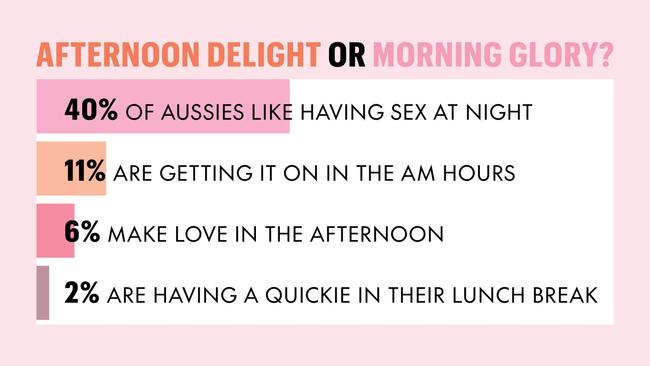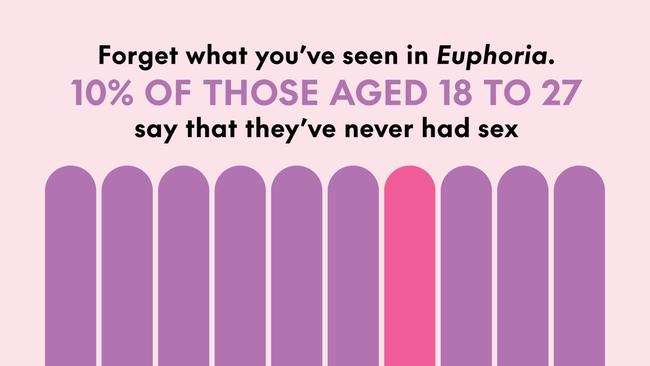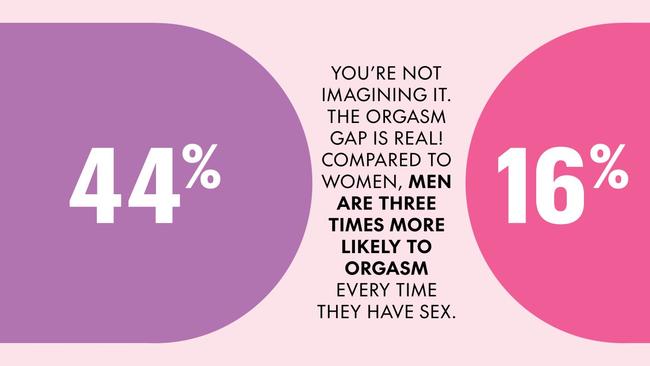This is the average number of sexual partners in Australia
Because if you can’t ask your partner, you can ask the nation
Lifestyle
Don't miss out on the headlines from Lifestyle. Followed categories will be added to My News.
When it comes to how many people we’ve bedded, the truth is often a closely guarded secret. Whether we consider it a little underwhelming or that our lists boast a few too many, we’ve all got reasons for keeping our lineup on lockdown. Well, luckily the Body+Soul 2024 Sex Census is here to squeeze the spicy stats out of Australians.
It’s often a question we’re all dying to ask but dread being asked ourselves. ‘What’s your number?’
Whether it comes up in a gossip with the girls, bants with the boys or D&Ms with dates, it’s the heart racing, anxiety-inducing inquiry that we’ve all probably faced at some point in our lives.
“And everyone never knows what number to give when someone asks,” Vanessa Tarfon, a Sydney-based sex therapist, tells Body+Soul.
Well, we just had to know. So when the Body+Soul 2024 Sex Census went out to 2000 Aussies earlier this year, we threw in the question to end all questions. And the results were interesting to say the least.
What’s the nation’s number?
According to our stats, the average number of sexual partners for males in Australia is 16.4 and 12.2 for females. And while the average would actually be less, with 69 per cent of Aussies having had less than 10 sexual partners, because a relatively small number have had many more, it bumps the country’s average up to 11.6.
Which we found quite surprising, and we aren’t alone in that. “People are definitely having sex with less partners than what everyone thinks,” Tarfon says. “For example, I think a woman would walk into a bar and meet a man and, if he’s your typical masculine alpha male, she’ll be like, ‘Oh he’s had sex with at least 50’, in their heads, and you know the truth of that is probably very different.”
Which was kind of a general theme throughout the survey results to be honest, with Aussies wildly overestimating how much sex people are actually having. Such as when 78 per cent of respondents thought people were getting it on at least once a week. The truth is that less than half (45 per cent) of adults over 18 are having sex on a weekly basis.
But back to that question.

Why don’t we know what to say?
In case you’ve never been stumped by this inquisition before, the pressure to answer is overwhelming.
“For women, you don’t want to be seen as too promiscuous,” explains the sexual wellness and relationship specialist. “We’ve been told from a very young age not to be overly sexual, to hide our sexuality, to suppress our sexuality and, still to this day, hold our virginity in high regard, like it's something that you only give away to someone really special. Because you don't want to be judged, right? And so much of that judging comes from other women rather than men.”
So what do women do? “They always try to reduce their number,” says Tarfon. “Whereas men are the opposite. They tend to increase their number because they're taught the opposite. From a young age, they’re taught that they should be sleeping around to get experience, and it's like a badge of honour to be with lots of partners. They’re taught that it makes them more masculine, more worldly and more desirable.”

Which is having devastating effects. “It’s forcing our young boys into these uncomfortable sexual experiences where they don't necessarily want to be having sex,” the sexpert explains. “They don't necessarily want to be having sex at the age that they are as well, when they're really young, but they're playing into this whole masculinity myth as well.
“So there's definitely pressure on both sexes to either reduce or increase the number.”
So, kind of like the ‘rule of three?’
Remember that scene in American Pie 2 when Stifler explains that “when a girl tells you how many guys she’s slept with, multiply it by three and that’s the real number”? While for men, women are meant to divide their answer by a third.
“I don’t know where that number came from but it’s been around for decades,” Tarfon says. “And it’s one of these random social conceptions and myths that has developed and people still believe it.
“I still hear people talking about it now. Especially now with online dating and meeting people. It's like, ‘Oh, she told me she's been with 10 so that’s got to be at least 30 or 40’.”

Where does the judgement come from?
Firstly, let’s blame our historically harrowing sex education.
“We really only teach about contraception and reproduction, we don't teach about pleasure,” says the sex therapist. “Of course, we teach boys that, essentially, it's a rite of passage to masturbate and that they should be masturbating. But we don't teach that to girls. We don't tell girls to explore their own bodies.”
Then there’s social, cultural and religious influences, as well as family advice and expectations. “And it all starts at such a young age that it’s really hard to turn that around,” Targon explains. “It's really only when people get to a certain age where they actually start to think of themselves and want to investigate things that they have that kind of ‘aha’ moment and go, ‘No, that's not right, I'm not going to follow that anymore, I'm actually going to source my own information.”
Then there’s porn. “And if you don't have someone to teach you what is good porn and what is bad porn, then of course, what is easily accessible is the porn that is more male dominant or focused towards the male audience, as opposed to a female.”

So, should you ask your partner what their number is?
Still on the fence about whether you should bring this topic to the table? You might want to read Tarfon’s thoughts first.
“People think it’s going to give them an insight into their partner’s personality, what their thoughts are and how they view sexual relationships,” the sexual health and relationship expert says. “But it’s unlikely to turn out like that due to our own unique beliefs and judgments that we have internalised from our own teachings of family, social, cultural and religious influences.
“If a woman asks a man that question and his number is 50, she’s automatically probably going to judge him and think, ‘He just wants to have sex with me, he can't commit’. There’s all these misconceptions that are automatically going to come straight to mind.”

The conclusion? “I don't think it's a necessary conversation,” Tarfon argues. “It's not something that I would bring up on purpose as a specific question. If it comes up in a conversation, you could definitely ask it, but to me, it's not essential because it doesn't really matter.”
The only time it would matter, she explains, is if it was your first time.
“To me, every relationship and every sexual encounter is different, and it doesn't matter how many partners you’ve had prior to that. It doesn't tell me whether you're going to be good or not. And I think it can be harmful, especially if you're a narrow minded person.”
More Coverage
Originally published as This is the average number of sexual partners in Australia




